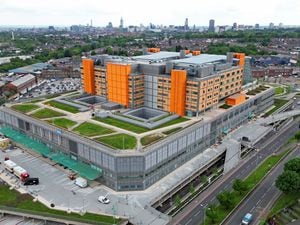168,000 patients waiting for routine treatment at Black Country hospitals
More than 160,000 patients are waiting for routine treatment at Black Country hospitals – a rise of 46 per cent in a year.

Waiting lists have grown to record levels in the wake of the coronavirus pandemic, and the number of patients waiting for planned operations and procedures at the region's NHS hospital trusts by the end of December had grown by thousands in a single month, new figures show.
Among those are people needing scans and tests, hip and knee operations, and cataract surgery.
It comes as Health Secretary Sajid Javid has set out plans to help the NHS recover from Covid-19, but he has said waiting lists will continue to rise for another two years.
Measures announced by the Government to tackle issues within the health service, include prioritising diagnosis and treatment, increasing activity through dedicated surgical hubs, and hiring 15,000 more care workers by the end of March.
Prime Minister Boris Johnson said the plan was the “biggest catch-up programme in the history of the health service backed by unprecedented funding”.
NHS England figures show 168,859 patients were waiting for non-urgent elective operations or treatment at The Dudley Group, Royal Wolverhampton, Sandwell and West Birmingham Hospitals and Walsall Healthcare trusts at the end of December – up by 3,558 on the month before.
In December 2020, the figure stood at 115,300.
31,577 patients were waiting for non-urgent elective operations or treatment at The Dudley Group NHS Foundation Trust at the end of December – up from 31,306 the month before and 70 per cent more than a year earlier, when there were 18,573 patients on the waiting list.
The number has risen by 51 per cent in a year at The Royal Wolverhampton NHS Trust, which had 56,449 patients on its waiting lists by the end of 2021 – up from 54,685 the month before.
In December 2020 there were 37,271 patients waiting.
Sandwell and West Birmingham Hospitals NHS Trust saw a 33 per cent rise in the year to December, when 53,020 patients ended up on the waiting list for non-urgent elective treatment.
While at Walsall Healthcare NHS Trust 27,813 patients were waiting at the end of last year – 41 per cent more than a year earlier, when there were 19,656 patients on the waiting list.
A report outlining how the Royal Wolverhampton NHS Trust had performed in December was put before its board of directors this month.
It said the growth in its waiting list had been smaller than for other Black County trusts but remained a challenge given the impact Covid is having on operations.
A report to the latest board of directors meeting at Walsall Healthcare NHS Trust also acknowledged the challenges.
It said: "Providing timely routine elective care is important given many patients will be suffering pain, discomfort and loss of independence whilst awaiting treatment and the clear evidence that patient outcomes can be adversely affected by excessive waiting times for treatment."
Diane Wake, Senior Responsible Officer for Black Country Provider Collaborative, said: “Our staff have worked around the clock to treat people with Covid-19 alongside other conditions, for the last two years during the ongoing pandemic. This has meant reducing services to ensure we had sufficient capacity, resulting in some unavoidable, longer waiting times for some of our patients.
"We have now restored all our services and are now actively planning on treating more patients than before in line with the recently published recovery plan.
“We are currently prioritising those patients who have been waiting the longest alongside clinical urgency and utilising mutual aid from other organisations that have capacity across the Black Country.
“We have always been here for those who need urgent and emergency care, and urge people not to delay seeking help from the NHS when they need it, whether through NHS 111, their GP, a pharmacist or hospital.”





